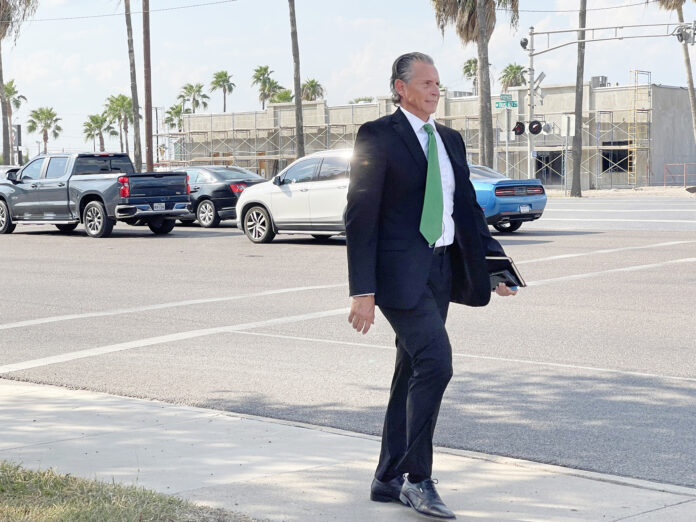
An Edinburg man has been found guilty of violating the National Wildlife Refuge System Act for attempting to take bird feathers, salt crystals and other items from Sal del Rey, a federally protected part of the Lower Rio Grande Valley National Wildlife Refuge System.
U.S. Magistrate Judge J. Scott Hacker handed down the guilty verdict against Eduardo Leal, 52, in a 14-page memorandum Monday.
Hacker presided over Leal’s bench trial last month after the man rejected a deal from federal prosecutors to plead guilty to two federal misdemeanor charges in exchange for paying a monetary fine of just a few hundred dollars.
With the guilty verdict, Leal now faces the potential of spending up to six months in federal prison, along with up to $5,000 in fines.
Leal was apprehended by a U.S. Fish and Wildlife Service park ranger last October as he was attempting to leave Sal del Rey, one of three naturally occurring salt lakes located north of Edinburg along State Highway 186.
During the Sept. 10 bench trial, Romeo Garcia, senior federal wildlife officer, testified that Leal had 31 bird feathers, a bird wing, several salt crystals, animal bones and pieces of wood in a backpack and in his arms as the man attempted to leave the refuge.
Garcia issued two citations against Leal — one, a violation of the National Wildlife System Act, the other a violation of the Migratory Bird Treaty Act. Both were federal misdemeanor citations.
When Leal made his initial appearance on the two charges in February, he requested the case go to trial. Leal later changed his mind, agreeing in June to plead guilty to the charges as part of a plea deal wherein he would pay just over $500, or half the cost of the citations.
However, when he appeared in court the following month to formally plead guilty, Leal again changed his mind and decided to exercise his right to a trial.
Speaking outside the courthouse after the one-day trial last month, Leal said he changed his mind as a matter of principle and because he believed in the justice system.
“That place is a spiritual place. It’s a vortex of energy. It’s a treasure for the country,” Leal said of the refuge.
“This has nothing to do with (disrespecting) the land; completely the opposite. But I guess it’s one of these things that need to happen to make a point break on what things are important, what things need to be changed,” he said of leaving his fate up to a trial.
Ultimately, at trial, prosecutors offered Leal one concession: they dropped the second charge against him — the migratory bird act citation — and only pursued the refuge system act violation.
Leal said he hadn’t been aware that it was illegal to remove objects from the refuge, but in his analysis of the legal standards in the case, the judge found that Leal’s lack of mens rea — or unawareness of his wrongdoing — had no bearing on whether he was guilty of violating the law.
“The question as to what, if any, mens rea finding is required is largely academic. This is because the record supports a finding that Defendant acted purposely,” Hacker wrote, finding that even if Leal was unaware that removing objects from the refuge was illegal, he nonetheless had intended to remove them.
As part of his defense strategy, Assistant Federal Public Defender Christopher Gonzalez argued that Leal had not actually removed anything from the refuge, but had only attempted to. Indeed, the park ranger encountered Leal as he was returning to his vehicle — which was parked on a closed road — but before Leal had left the refuge boundaries.
But the judge found that argument unviable.
“Although there appears to be a dearth of authority on this question, the emphasized language implies that taking items outside of a refuge is not necessary for a finding of guilt. It is sufficient for a person to possess an enumerated item within the boundary of a refuge,” Hacker wrote of his analysis of the statute.
As far as the law is concerned, it was enough that Leal “possessed” the items at all, he found.
Gonzalez also argued that removing the items had not damaged the refuge in a substantial way, citing a passage from a 25-year-old U.S. Fish and Wildlife Service conservation plan that regulates the management of the Valley’s national refuges.
According to that plan, refuge visitors are allowed to enjoy “recreational uses … [that] are considered compatible when they do not ‘materially detract from or interfere with the purposes for which a refuge is established.’”
Gonzalez latched onto the term “materially detract,” arguing that Leal had not killed any animals in order to harvest the feathers — a fact confirmed by Garcia, the park ranger.
Nor would removing a few salt crystals have any noticeable impact on the salinity of the 530-acre salt lake and its estimated 4 million tons of salt, the public defender said.
As Gonzalez put it, the few crystals Leal had collected in a small box amounted to a “de minimis amount of salt.”
But again, Hacker found that argument irrelevant to the case at hand.
“Clearly, Defendant possessed the salt, wood, bones, and feathers insofar as he exerted direct, physical control over these items by carrying them or having placed them in his backpack,” Hacker wrote, again leaning on the fact that Leal had possession of the objects.
“It is uncontested that the salt and wood was personal property of the United States. There is no requirement that the United States have a property interest in the bones and feathers. Instead, the statute criminalizes the mere possession of these items in the Refuge,” Hacker wrote.
Leal is due back in federal court for sentencing on Oct. 22.



